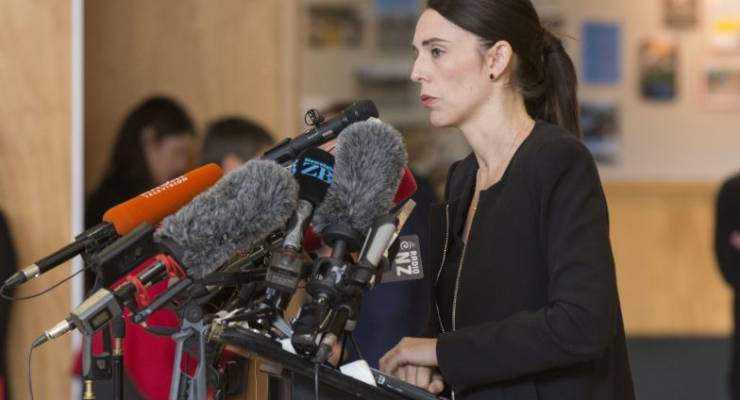
In an age of resurgent nationalism and populism, Jacinda Ardern has provided a rare beacon of hope for centre-left politics since she led New Zealand’s Labour Party out of the wilderness in 2017.
Even before last year’s Christchurch atrocity, Ardern had established an unusually high international profile due to her youth and the novelty of being the first leader of a western country ever to give birth while in office.
In its wake, she was praised for epitomising a spirit of empathy and inclusiveness that was understood to stand her in contrast to many of her conservative peers.
Such notions have naturally met loud resistance from culture warriors of the right on this side of the Tasman, which found new expression after her visit to Australia last week.
By this narrative, Ardern’s popularity abroad is not shared by those who have experienced her rule first hand, and should be seen as another folly of an out-of-touch left that similarly deluded itself about Hillary Clinton, Bill Shorten and the European Union.
The Australian has led the way, running no fewer than three anti-Ardern editorials in the past six weeks, together with a front page report on Thursday headlined “Celebrity abroad, Ardern labours at home”.
The latter report highlighted a recent poll by Colmar Brunton showing the National Party opposition on an impressive 46%, equalling the combined vote for Labour (41%) and the Greens (5%).
However, New Zealand’s two regular pollsters, which both performed well in 2017 and continued to track closely together through to Christchurch, have had notably different stories to tell of late.
Reid Research’s recent polls have had National around three points lower than Colmar Brunton did, suggesting a result in which Labour could govern with Greens support — the best it can realistically hope for under proportional representation.
The only other pollster to test the waters in the past year has been the ubiquitous YouGov, whose one poll in November was weaker still for the National Party.
Even the Colmar Brunton poll credited Ardern with a vast lead over National leader Simon Bridges as preferred prime minister, while 63% of Reid Research respondents felt she was doing a good job.
It’s true that Ardern’s credentials as a vote-winner are yet to be established where it matters, notwithstanding the small matter of her success in securing the prime ministership.
At the 2017 election, held less than two months after Ardern became opposition leader, the National Party outpolled Labour 44.4% to 36.9%, and appeared at the time to have become the country’s first government since the 1960s to have secured a fourth term.
That this did not come to pass was down to the mercurial Winston Peters of the populist New Zealand First party, who unexpectedly cut a coalition deal with Labour despite the awkward fact that Greens support was needed to make up the numbers in parliament.
Ardern’s need to balance alliances on the left and right has constrained her government in office, and the tie to New Zealand First has lately associated it with a donations scandal that has engulfed the party and its leader.
Labour’s chances of breaking out of this straitjacket when the next election is held on September 19 may ultimately depend as much on the vagaries of New Zealand’s mixed-member proportional electoral system as the balance of support between Labour and National.
Mixed-member proportional entitles parties to seats in proportion to their national vote share if they either win a constituency seat — which neither the Greens nor New Zealand First managed in 2017 — or clear a threshold of 5% of the national vote, which can leave minor parties dancing a fine line between six seats and none at all.
Present indications are that the beleaguered New Zealand First won’t make the cut this time, which is unlikely to sadden Labour too much.
However, the latest polls suggest the Greens too are no certainty to stay afloat thanks to Ardern’s appeal to progressive voters, which could perversely result in nearly 5% of the left vote going to waste.
If that does not transpire, a National Party lacking in natural coalition partners will have to restore its support to the heyday of John Key’s prime ministership from 2008 to 2016 if it’s to return to power.
Given Ardern’s evident popularity and the disinclination of voters to turf governments after a single term, that still seems hard to credit.








Rupert’s Muppet Orchestra are orchestrating a coup against Ardern now?
Talk about a Bay of Miss Piggies.
I hope the Kiwis are smart enough to give their progressive leader another and better run, and turn their backs on conservative forces until such time as they see the light of rapidly declining environmental circumstances.
Aotearoa has the advantage of not being totally riddled by the necrotic worms of NewsCorpse.
This article is just one of the reasons I have a subscription to Crikey, year by year news ltd newspapers & tv shows ,are becoming more like the European fascist media of the 1929s .
I was browsing through the free Hun in my café last week and saw Rita Panini (sp?) tear into Ardern in that particularly unlikable sneering manner of hers. Immediately I thought that Jacinta must be doing something right to so trigger the Murdock hacks. She is now in even higher esteem for me.
Jacinda! (apologies Kiwi friends).